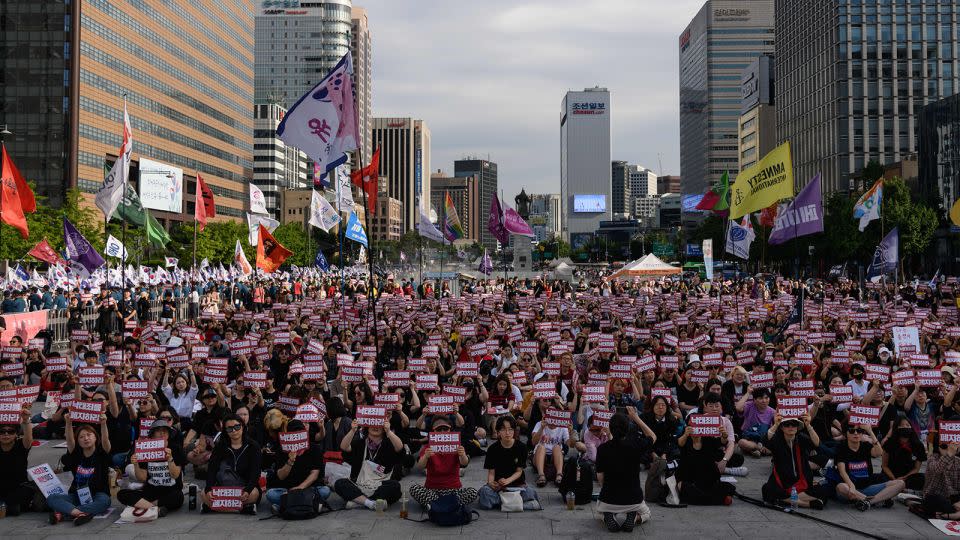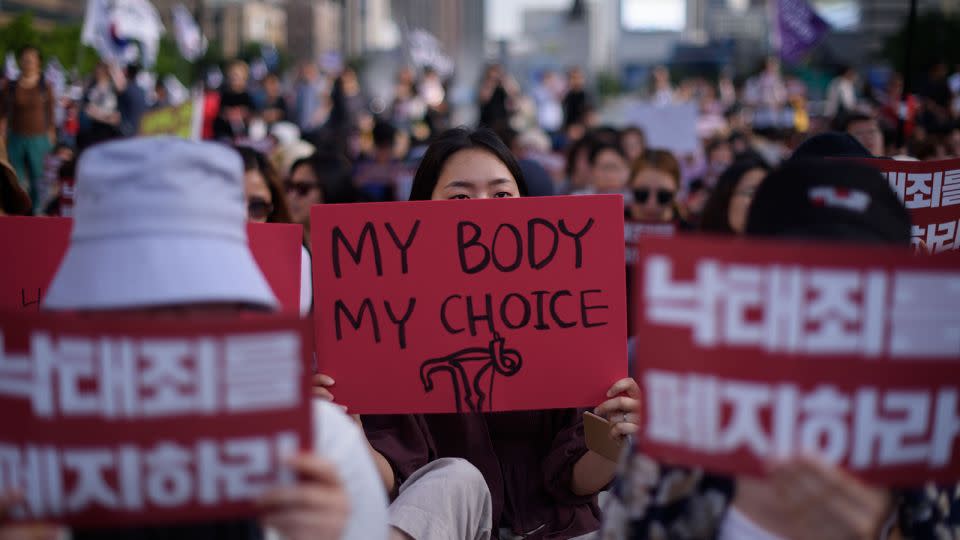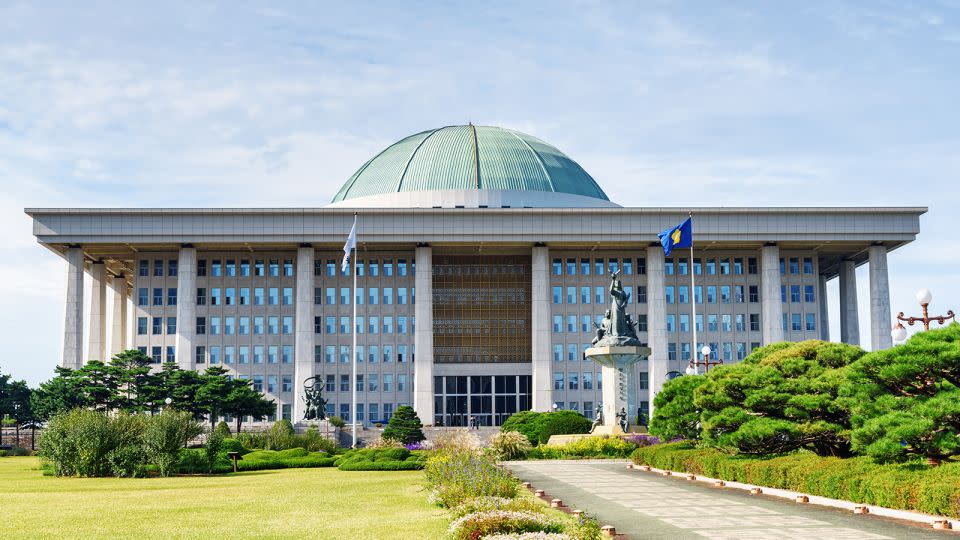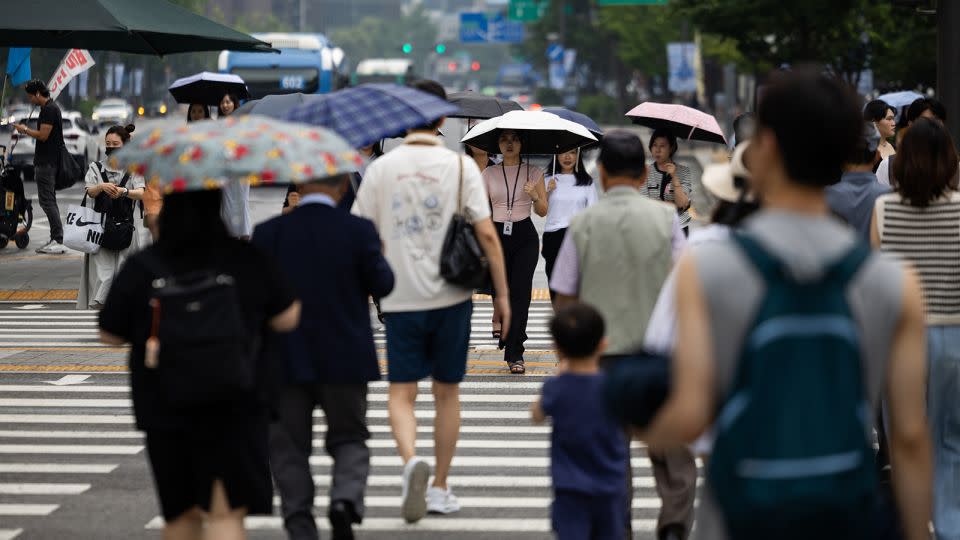A South Korean vlogger who claimed to have terminated her pregnancy at 36 weeks is being investigated for murder in a case that’s prompted horror in South Korea and raised urgent questions about why the country has no abortion laws.
Seoul National Police began investigating the woman in July at the request of the South Korean government, after she posted a video to YouTube purportedly documenting her experience of getting an abortion, police told CNN.
Abortions past 24 weeks are banned in many jurisdictions, or reserved for very exceptional cases, such as fetal anomalies or when the mother’s health is at risk.
But in South Korea, there are no laws governing when, where or how abortions can take place – and there haven’t been for almost four years.
It’s a policy vacuum that experts say not only opens the door to potential malpractice but also hinders access to safe abortions, with women and doctors forced to navigate a state of legal uncertainty.
In a joint statement, a coalition of 11 South Korean women’s organizations and NGOs slammed the government for pursuing women who terminate pregnancies rather than improving access to abortion care.
“This is nothing short of a pathetic and serious attempt to evade responsibility and shift blame,” the statement said.



A legal hole
For more than six decades, performing an abortion in South Korea was a crime punishable by up to two years in prison, with limited exceptions for rape, incest, and threat to the health of the mother or the baby.
Pregnant women who chose to terminate could also be jailed for up to one year.
But in 2019, South Korea’s Constitutional Court overturned that ban, giving the National Assembly until the end of 2020 to enact new abortion laws, which the court recommended should include a term limit of 22 weeks.
When the legislature failed to meet that deadline, the criminal provisions around abortion expired, effectively legalizing abortion at any stage of pregnancy.


By not passing abortion laws, the National Assembly is “not doing its job,” said Cho Hee-kyoung, a law professor at Hongik University in Seoul.
“If there is no law criminalizing a conduct, then there is no crime for carrying out that conduct,” Cho said.
Decriminalization of abortion was a major win for reproductive rights advocates, who at the time faced stern opposition from conservative and religious groups, some linked to US anti-abortion campaigns.
But their victory has been dampened by what’s come – or hasn’t come – in the years since.
“Since the criminality of abortion was banned, we have been asking the health and welfare ministry to classify abortion as a right of health, not as a subject of punishment, and to come up with policies,” said Nayoung, a representative for SHARE, an organization in South Korea that provides services related to sexual and reproductive health and rights.
But no new policies have passed. Instead, debates in the National Assembly about abortion policies have faced renewed opposition from religious groups, which hold powerful sway with lawmakers in a country where traditional gender norms dominate.
In a statement posted to its website in June, the country’s Ministry of Justice said “the direction, details, and timing of the revision” of abortion laws have not yet been decided, and that it needs to consult with the Health and Welfare Ministry, which oversees the Maternal and Child Health Act.
“The Ministry of Justice will do its best to discuss the issue so that the right to life of the fetus, and the right to health and the right to self-determination of the pregnant woman can be harmonized,” the statement added.
The Health and Welfare Ministry told CNN that it will “actively support the legislative process” with the current National Assembly, as proposed revisions had all expired with the end of the previous parliament term in May.
Changing attitudes to abortion
Despite the country previously having highly restrictive abortion laws, abortion has not historically been the lightning rod in South Korea that it has been in the United States.
Between the 1960s and the mid-2000s, the South Korean government strongly emphasized family planning to curb population growth, to the point that abortion was seen as an “alternative method of birth control,” said Cho, the law professor.
Social stigma placed upon single and unwed mothers also facilitated the hushed acceptance of abortion, she said. “Even police officers and their wives, prosecutors and their wives and mistresses, were getting abortions.”
While abortion has long been allowed to operate in the shadows, authorities began cracking down on the procedure in the mid-2000s.
Doctors were charged with performing abortions, prompting a court challenge that sought to safeguard the rights of women to seek an abortion and for doctors to provide them.


At the same time, South Korea’s birth rate was dropping and the government was seeking ways to boost the population. Along with new forms of contraception that could prevent pregnancies, the public mood towards abortion shifted, according to Cho.
“It’s not something that people take lightly, and people might tend to see it as being somewhat irresponsible,” she said.
If overpopulation had once prompted the government to push abortions, South Korea was now dealing with the opposite problem.
South Korea’s fertility rate was 0.72 children per woman in 2023, according to government figures, far below the 2.1 rate the OECD estimates a country needs to achieve population stability without immigration. By comparison, the fertility rate in the US was 1.7 in 2022, according to the World Bank.
Fertility rates below 1.5 can plunge countries into a trap where low fertility drives population aging and economic stagnation – further deterring childbearing and driving the fertility rate lower.
It is impossible to know the true number of abortions that take place each year in South Korea because the procedure is unregulated.
There’s no reliable historical comparison because back when abortion was still a crime, patients would pay hospitals in cash so there was no official record, said Nayoung, from SHARE.
But according to estimates from South Korea’s Institute for Health and Social Affairs, the number of abortions has fallen drastically in recent decades, from an estimated 241,411 in 2008 to just 32,063 in 2020, the last year for which statistics are available.
Advocates say the true abortion rate is likely much higher.
Abortion pills banned
In the absence of clear regulations, women and abortion providers currently operate in a gray area with little guidance as to what is permitted and what might break other laws.
Credible information about where to get an abortion is hard to come by, and the procedure is not covered under the country’s public health system.
Often, women will rely on word of mouth to find a clinic that will perform an abortion, at a cost of hundreds of dollars that they must pay out of pocket, said Susanné Seong-eun Bergsten, an officer in the women’s rights division for Human Rights Watch.
“Women are really suffering,” said Bergsten. “They’ve been waiting for five years for something to change.”
While surgical abortion is now technically legal, abortion medication – which offers a safe, affordable and effective way to terminate a pregnancy in its early stages – is not, underscoring the difficulty women in South Korea still face in exercising their reproductive rights.


In May, a South Korean court rejected an appeal by Women on Web (WoW), a Canadian NGO that delivers abortion pills by mail, and digital rights organization Open Net Korea, to open access to the WoW website, which has been blocked in South Korea since 2019.
Access to the WoW website was blocked at the order of Korea’s Communication Standards Committee, which oversees broadcasting content and the internet, for violating the Pharmaceutical Affairs Act by selling the abortion-inducing pill mifepristone, the committee told CNN.
Mifepristone blocks the progesterone hormone needed for a pregnancy to continue. When taken with another drug called misoprostol, it can end a pregnancy up to 10 weeks. Both medicines are on the World Health Organization’s list of essential medicines.
WoW has filed a final appeal to the Supreme Court.
“By blocking the website of such an organization, the government is rather creating an environment where people need to look for unofficial and unsafe pills,” Nayoung said.
No drugs to terminate pregnancies are approved for use in South Korea, and the Ministry of Food and Drug Safety told CNN none are being reviewed for potential sale.
In their statement, the 11 women’s organizations and NGOs said abortion pills were predominantly available on the black market.
“At this point, it is not an exaggeration to say that the government has actually deepened the conditions that lead to more late-term pregnancy terminations and anonymous births,” the statement said.
Entrenched gender norms
While South Korea has done little to support women who want to end their pregnancies, the government has added new supports to encourage pregnant women to carry their babies to term.
In July, South Korea began offering counseling services to pregnant women and new mothers experiencing economic, physical and psychological difficulties.
In a recent report, the government cited what it said were several success stories including the case of a woman who decided not to have an abortion after learning of the added support available to her.
Advocates are skeptical that more liberal abortion laws will pass soon, because of society’s attitude towards women.


South Korea has the worst gender wage gap in the Organization for Economic Cooperation and Development (OECD) and has bottomed out the Economist’s glass ceiling index, which measures the role and influence of women in the work force, for more than a decade.
The country’s president, Yoon Suk Yeol, was elected two years ago pledging to abolish the country’s gender equality ministry, and courts support from young anti-feminist men.
“(Women) are still seen as the main caretakers of the home, of the children,” Bergsten, from HRW, said.
“It’s a very old kind of gender stereotype that’s still going very strong in South Korea.”
It’s unclear what motivated the YouTuber to post about her experience online.
Police told CNN they analyzed the video to track down the woman, who is in her 20s, and the hospital allegedly involved in the procedure.
The doctor who allegedly performed the abortion was an obstetrician brought in from another hospital, police told CNN-affiliate YTN, adding that the unnamed hospital initially falsely said it was one of their own doctors.
Along with the woman and the doctor, police are investigating at least five other medical staff who allegedly participated in the abortion, and a broker, YTN reported.
Police told CNN the woman’s hospital record said the baby was stillborn, but that she’d also admitted to getting an abortion.
If there’s enough evidence to prove the baby was born alive, the woman could be charged with murder, said Cho, the law professor. Police will have to find evidence of other crimes, beyond abortion, to place charges in this case, she added.
“I think it’s difficult to prosecute either doctor or the woman for abortion because the crime of abortion doesn’t exist anymore.”
CNN’s Kim Jiyeon, Rhee Sooyoung, and Yoonjung Seo contributed to this report.
For more CNN news and newsletters create an account at CNN.com
